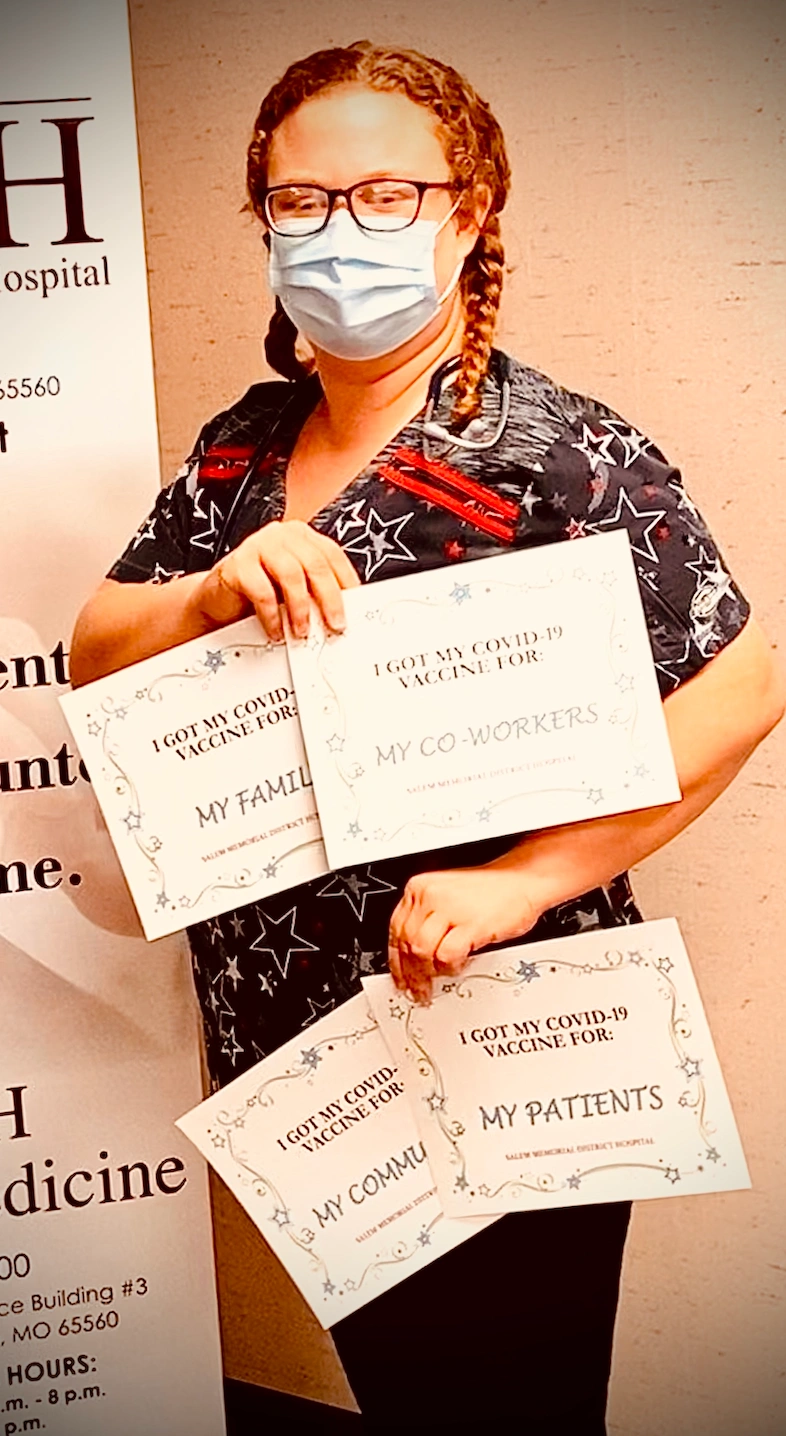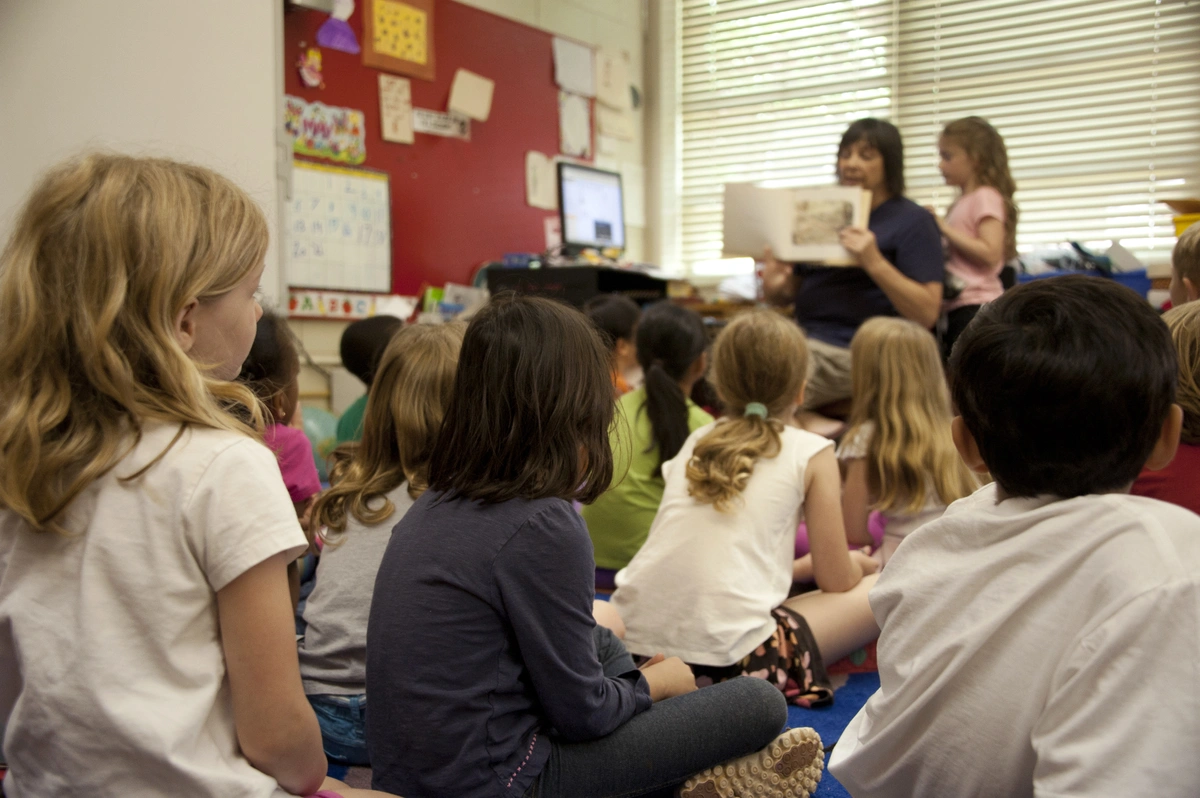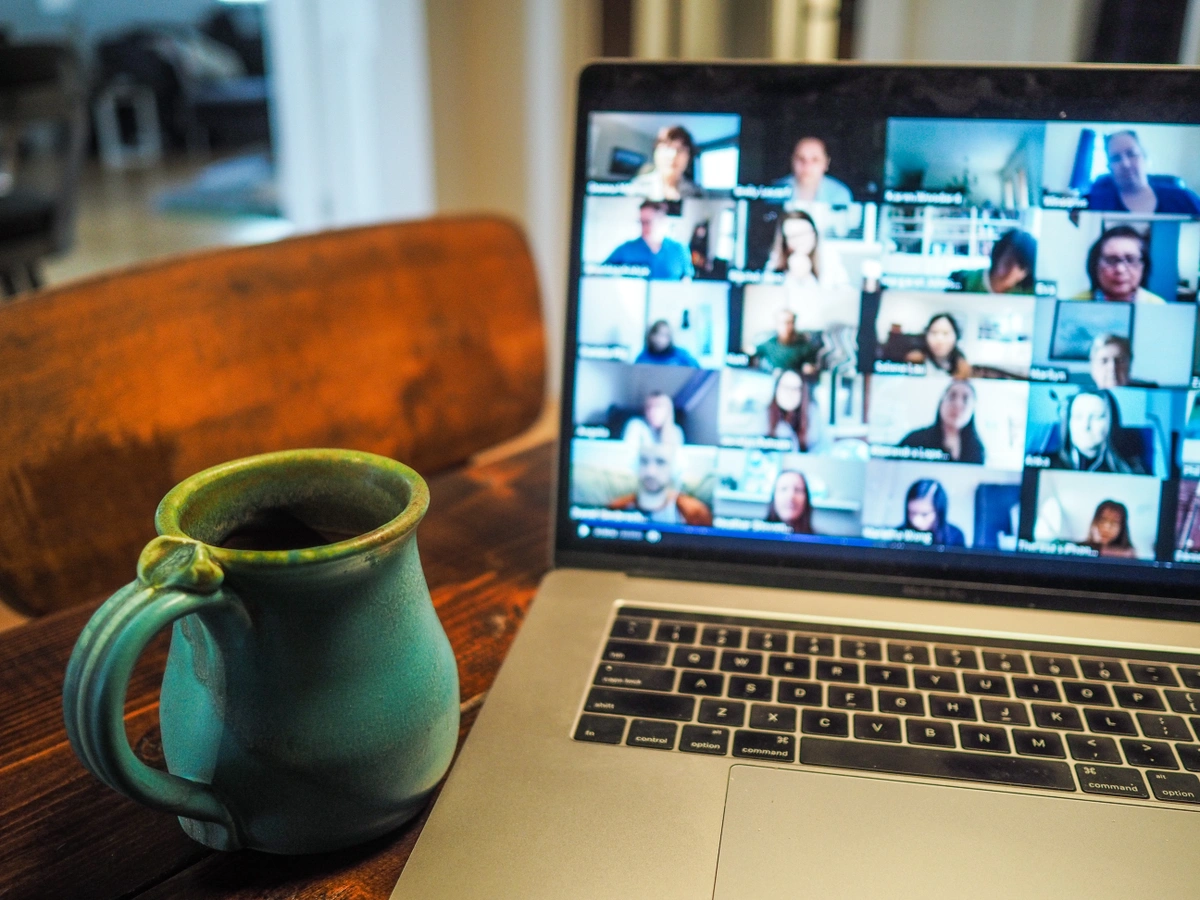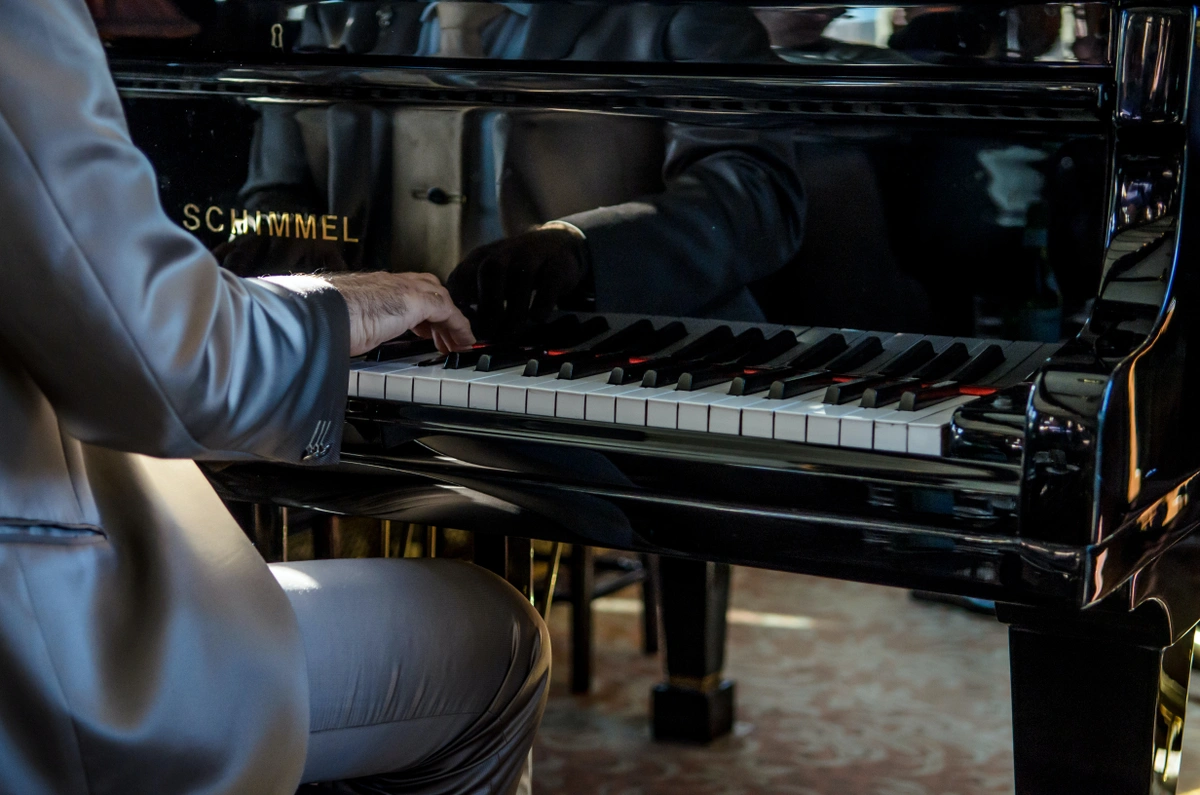How I'm Healing from V Injury with a Whole-Body Approach: Chelsey’s Story
July 6th, 2023
Disclaimer: This is a Kindred community member article that represents the opinions and experiences of the author, not Hugo Health Kindred. Please consult with your healthcare provider before trying any treatment.
I’m Chelsey, and I’ve been a respiratory therapist for 12 years. I worked through the COVID-19 pandemic at the hospital in my hometown and saw the sickest of the sick. For some, no matter what we did, we couldn’t get them to oxygenate. So, when the vaccine became available, I decided it would be the right thing to get it. I believed it was safe and effective as we were told. I knew it would be mandated for healthcare workers too.
I felt normal after the first shot, except for a sore arm. A few days later, though, I noticed small blood clots after using the toilet, and I had been off my period already for about 2 weeks. A little concerned, I called my primary care provider (PCP). She told me it was probably just the stress from the vaccine and “no big deal.” It went away after a few days but returned with each period.
Three weeks went by, and it was time for my second vaccination. I was lightheaded and dizzy within 24 hours of getting the vaccine. I was short of breath and constantly felt like I might pass out. My Apple watch was notifying me that my heart rate was dropping to 30 or 40 beats per minute which is super low, and then jumping up really high. I scheduled an appointment with my PCP 3 days after my vaccination to discuss these issues.
The first few months of vaccine injury
Within the first few months, I probably went to my PCP six times. They ran many tests, and everything always came back normal, despite my heart rate fluctuating dramatically. It was the weirdest feeling not knowing what was happening to my body. I was told it had to be anxiety and was sent to a psychiatrist. I trialed three or four anxiety medications. I never believed that anxiety was causing my symptoms, but I was experiencing anxiety from all the uncertainty. So, in that regard, the medication did help.
I started to put together a timeline at that point, and it was evident that my symptoms coincided with when I got the second COVID vaccine. When I brought this information to my PCP, though, she didn’t believe me, so I started to look for another provider. Like everyone else, I saw many providers trying to find someone who believed me.
Meanwhile, new symptoms kept arising. The right side of my face would go numb and tingly and start drooping (I thought I was having a stroke!). My eyes would twitch, and I had tinnitus. I had horrible pain in my right shoulder and down my whole arm. I progressed from feeling lightheaded to having cardiac issues. I was numb and tingly on the right side of my arm and torso. Symptoms would come and go and last for an hour or a few hours. The strangest thing was that my symptoms were all concentrated on the right side of my body and moving down.
Turning to online communities for answers
Toward the end of 2021, I started to look online for answers. I looked at research studies and would send them to providers I was in touch with. I looked at Twitter Spaces being held by providers treating vaccine injury and those with injury themselves. I joined Facebook groups for people with vaccine injury. I learned about organizations like React19, RealNotRare, and the Front Line COVID-19 Critical Care Alliance (FLCCC).
Everyone was supportive of one another and helpful in pointing you in the right direction for which tests to get or therapies to try. When I realized many people were going through the same thing I was, I was relieved that I wasn’t alone but deeply saddened that this was happening to so many people worldwide.
Continuing to advocate for myself
I started seeing a neurologist in the fall of 2021, and when tests returned normal, I didn’t give up. I sent him quotes and studies posted online by people with vaccine injury who had symptoms similar to mine. One of those studies linked small fiber neuropathy (SFN) to the COVID vaccine. Eventually, I was tested for SFN, which returned positive. It was my first actual diagnosis.
I decided to see a functional medicine doctor not long afterward because many people in the Facebook groups saw improvements by supplementing with vitamins and minerals. Luckily, I found someone nearby who truly believed the body could heal. She ran labs that other providers never did and found I was low in vitamin D, B12, D, C, and others, so I started to supplement those. We also did hyperbaric oxygen therapy, ozone therapy, and dialysis. After a few weeks, I was already beginning to feel better.
We did a stool test about 2 months after my first appointment, and it turned out I had only bad bacteria in my microbiome, no good bacteria. I even had a particularly bad bacteria that can cause weird neurological symptoms. That’s when I started focusing more on what I was putting into my body. Some changes I made include:
- removing processed and fried food from my diet
- cutting down on dairy
- reducing my carb intake
- adding in some probiotics
- drinking about 100 ounces of water daily
- intermittent fasting and only eating between noon and 8 p.m
I saw a significant improvement in my symptoms after only a few weeks, including a normal period for the first time in 2 years. I’m not 100% yet, but I feel very close.
The importance of emotional support
I was lucky to have a supportive family throughout this period. They saw firsthand what I was dealing with and shared my story with their friends to help raise awareness. I know it was challenging for them, too, not knowing what was happening or how to help me. I lost a lot of friends, though. They saw me at my worst but couldn’t believe the vaccine caused it. I don’t talk to them much anymore because of it. This is my sincere story. I would never lie. It hurt a lot that they didn’t believe me.
As a healthcare worker, I was shocked by how most medical professionals treated me while searching for care. I fight so hard for my patients, but these providers just wouldn’t believe me and what was happening in my body. It made me sad for the healthcare system in this country.
My colleagues at the hospital, though, have been great. The little group I work with is like family. They always believed and supported me. When I couldn’t work, someone would cover me. They’d understand if I needed to sit down during a shift. I’ve also talked to infection control at the hospital (the department that administers the vaccines) about updating the consent forms to include the many adverse reactions people are experiencing. People need to be able to make their own decisions. If someone wants to get the vaccine, there should be informed consent.
Looking ahead
The first time I didn’t have symptoms for a week, I cried to my significant other. I was like, is this really happening? Am I not going to have to deal with this for the rest of my life? It’s great, and it’s hard because, in the back of my mind, I’m always scared it will come back. I try to stay as hopeful as possible. Switching to a new diet is always challenging, but my strong desire to improve motivates me. And when I slip up, my symptoms do worsen, so that helps keep me on track.
I no longer have that constant feeling of impending doom. I believe our bodies are miraculous, and healing is always possible. I’m in a completely different place from a year ago, and grateful I didn’t give up. I’m grateful I found the Facebook groups and Twitter spaces. I’m grateful for my family and friends that stood by me. I’m grateful for the healthcare providers fighting for the injured.
My message for others
People got in line for this vaccine because they believed it was the right thing to do. But if something goes wrong, nobody is there for you. You have to fight like hell for yourself. There are so many people out there with way worse stories than mine. I hope they find out what’s happening and get the help they need. Providers might try to put you in a corner and tell you it’s anxiety, but nobody knows what’s happening in your body better than you. Never give up, you’re not alone.
This article was written by Talia Aroshas as told by Chelsey Perry. If you have questions for Chelsey or would like to connect, you can email her at csperry07@gmail.com.
Chelsey Perry has a bachelor’s in respiratory care and has worked as a staff respiratory therapist for 12 years. She currently works at her local hospital in rural Missouri. She collaborates with doctors and other healthcare professionals daily, caring for the sick in her community. She's best known for being a patient advocate. Recently she had to fight as her own advocate in an attempt to get her life back. Her goal is to increase awareness and spread hope to those with vaccine injury. This is the story of her vaccine injury induced by the COVID-19 vaccine.
Article resources:
- Finsterer J. Small fiber neuropathy as a complication of SARS-CoV-2 vaccinations. J Family Med Prim Care. 2022;11(7):4071-4073. DOI: 10.4103/jfmpc.jfmpc 2394 21
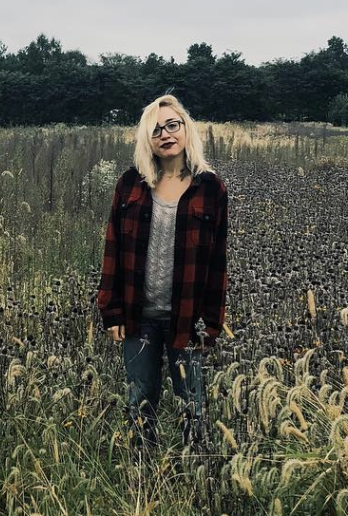
Talia Aroshas
Kindred Content and Community Manager
I’ve been working in health content as an editor since 2017. It's an honor to be able to provide people with resources that empower them to take an active role in their health journey. I believe in the body’s incredible ability to heal when given the necessary tools and presented with the appropriate environment. I’m thrilled to be on the Kindred team and to work with such a dedicated, passionate community.
